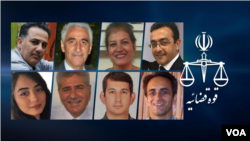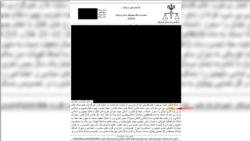Iran has reportedly summoned eight Baha’i citizens to begin prison terms after convicting them of security crimes for peaceful activities, including alleged communication with Western media and organizing educational programs for Baha’i children.
Speaking to VOA Persian on Monday, an Iran-based source who is familiar with the situation of the eight Baha’is residing in the southern port of Bandar Abbas said they received a court notice of the prison summons the day before. The source provided VOA an apparent copy of the document, which gives the six men and two women 10 days to turn themselves in to local authorities to start serving their sentences.
VOA cannot independently verify the authenticity of the document as it is barred from reporting inside Iran.
The document seen by VOA said an appeals court of Hormozgan province, where Bandar Abbas is located, finalized the prison sentences for the eight Iranian Baha’is in a Feb. 2 ruling. A lower court had sentenced them in December to between one and two years in prison for the charge of “gathering and colluding to commit crimes against national security.”
The document said the appeals court confirmed two-year sentences for Omid Afaghi, Mehrallah Afshar, Farhad Ameri, Adib Haghpajooh, Mahnaz Jannesar and Arash Rasekhi. It said one-year sentences were confirmed for Nasim Ghanavatian and Maral Rasti.
Iranian authorities initially detained the Baha’is in April 2017, arresting seven of them in Bandar Abbas and on nearby Qeshm island and the other, Adib Haghpajooh, in the south-central city of Shiraz. They were released on bail later.
According to the apparent court notice seen by VOA, the eight Baha’is were convicted of the national security charge in part for allegedly sharing information with Persian-language U.S. and Britain-based news outlets deemed hostile by Iran’s Islamist rulers, including VOA, BBC Persian and Human Rights Activist News Agency, or HRANA.
The document said the Baha’is also were convicted for providing educational programs for the youth of their community, including establishing a kindergarten and holding music classes and seminars for teenagers.
VOA Persian tried to contact the eight Baha’is to verify the reasons for their convictions but they declined to speak to VOA out of fear of further legal action against them by Iran’s judiciary.
A U.S.-based BBC News spokesperson contacted by VOA Persian on Wednesday for a reaction to the apparent conviction of the Iranian Baha’is for allegedly communicating with his organization said he was “unable to comment at this time.”
HRANA’s U.S.-based senior advocacy coordinator, Skylar Thompson, told VOA Persian that Iranian authorities were punishing the eight Baha’is for reporting violations of their rights.
“The sentences make it clear that the Iranian judiciary aims to keep victims of human rights violations silent so that authorities may continue to act with impunity. HRANA is actively working to counter the government’s attempt to silence these victims,” Thompson said.
The Hormozgan appeals court also apparently confirmed other punishments for the eight Baha’is in addition to prison time, including a two-year ban on membership in political and social organizations, a ban on attending Baha’i banquets and other gatherings, and a requirement to learn about Islam by attending five counseling sessions at the Sajjadieh Cultural Institute of Islamic Thought in Bandar Abbas.
Iran’s ruling Shiite clerics excluded the Baha’i faith from minority religions that they recognized in the constitution they adopted after seizing power in a 1979 revolution. Since then, they have deemed Iran's estimated 300,000 Baha’i citizens to be heretics with no religion.
Iranian authorities routinely arrest minority Baha’is for engaging in religious activities, accusing them of national security offenses without disclosing evidence. Most are charged with “propagation” of the Baha’i faith, which authorities consider to be a form of anti-government propaganda.
There has been no mention of the latest legal developments of the eight Iranian Baha’is in Iranian state media reports online.
The source who spoke to VOA said Iranian officials know that their discriminatory practices against minority Baha’is violate both Iran’s constitution and international human rights conventions to which Tehran is a signatory.
“So the Islamic Republic is unhappy when there are news reports of its inhumane actions against Baha’i citizens and it prefers to take such actions in secret,” the source said.
On a 2018 visit to New York, Iranian Foreign Minister Mohamad Javad Zarif asserted that “being a Baha’i is not a crime” in Iran. He also said “being a Baha'i does not immunize somebody from being prosecuted for offenses that people may commit.”
The Baha’i International Community’s Geneva-based representative to the United Nations, Diane Alai, said in a Thursday message to VOA Persian that the eight Iranian Baha’is facing imminent imprisonment are innocent.
"The Iranian authorities have to use their imagination in order to cover up their persecution, which is, as the whole world knows, solely based on religious grounds,” Alai said.
The bipartisan U.S. Commission on International Religious Freedom issued a statement last month condemning what it called the “alarming escalation of government measures targeting Baha’is in Iran on the basis of their faith.” The commission uses its religious freedom findings to make policy recommendations to the U.S. president, State Department and Congress.
The Biden administration, which took office last month, has not commented on the situation of Baha’is in Iran.
This article originated in VOA’s Persian Service. Click here for the original Persian version of the story.






